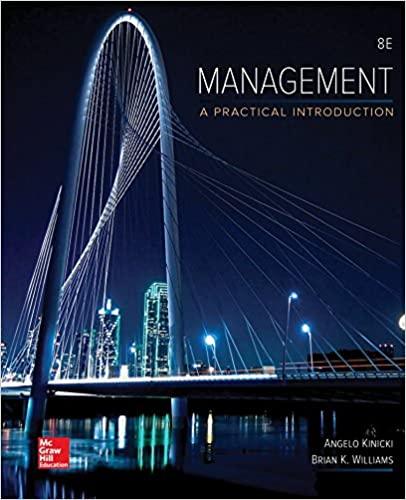Question
Read the follow case and answer the following questions: Chiquita Brands: Ethical Responsibility or Illegal Action? In the early 2000s,Chiquita Brands International, a Cincinnatibased multinational
Read the follow case and answer the following questions:
Chiquita Brands: Ethical Responsibility or Illegal Action? In the early 2000s,Chiquita Brands International, a Cincinnatibased multinational mar- keter anddistributor of food productswidely known for its Chiquita banana brand founditself in the middle of a crisis in its Latin American operations. Thecompany wasconfronted by a local armed paramilitary group, the United Defense Forces ofColombia, which attempted to extort substantial payments fromthe company tohelp fund the groups operations. The paramilitary group made it clear that if thecompany did not make the pay- ments Chiquitasemployees would be at risk.The companys managers took these threats seriously, because they believedthat, in 1995, the paramilitary group hadbeen responsible for bombingChiquitas operations and murdering 17 banana workers, who had been gunneddown on a muddy soccer field. Chiquitasmission emphasized a strong sense ofethical performance and social respon- sibility. It stated that it wanted to helpthe worlds consumers broadenmindsets about nutri- tion and bring healthy,nutritious, and convenient foods that taste great and improve peoples lives.Therefore, it was notsurprising that Chiquitas management also wanted toprotect its employees and ensure their safety while working for the company. In ahandwritten note, a Chiquita executive said that such payments were the cost ofdoing business in Colombia. The company agreed to make the paymentsdemanded by theparamilitary group, but hid the payments through a series ofquestionable accounting actions. From 1997 through 2004 Chiquita paid monthlyprotectionpayments totaling more than $1.7 million. After the September 11,2001, terrorist attack in the United States, the U.S. Government declaredtheColombian paramilitary group to be a terrorist organization. In February 2003, aChiquita employee informed a senior Chiquita officer that the companysprotection pay- ments were illegal under the new U.S. terrorism laws. Chiquitaofficials met with their attor- neys in Washington, DC, and were advised to stopthe payments to the terrorist group. Yet the company continued to make theprotection payments, amounting to an additional $825,000. In the minds of theChiquitas executives, stopping the payments would risk the lives of theiremployees. Chiquitas executives also considered but rejected the option ofwithdraw- ing operations from Colombia. But in a surprising move in April 2003,Chiquita decided to disclose to the Department of Justice that the company wasstill making payments to the Colombian paramilitary group. The company told the government that the payments were made under the threat of violenceagainst them and their employees. The Justice Department informed Chiquitathat these payments were illegal, yet the company continued to make the
payments. In 2007 Chiquita Brands International pleaded guilty to one count ofthe criminal charge of engaging in transactions with a designated global terrorist
group and agreed to pay a $25 million fine. Chiquitas troubles did not end whenit settled the charges filed by the Justice Depart- ment. In 2007, new lawsuitswere filed under the Alien Tort Statute, a 222-year-old law that allows foreignersto sue a U.S.based company in American federal courts if their claims involveviolations of U.S. treaties. The lawsuit claimed that Chiquita was responsible forthe deaths of 393 victims at the hands of the Colombian terrorist groupthatChiquita funded through their payments and demanded damages of $20 millionper victim, a total of $7.86 billion. The lawsuits pointed specifically to a 1997massacre in which 49 people were tortured, dismembered, and decapitated andanother incident in 2000 in which 36 more people were killed. Theprincipleupon which this lawsuit is brought is that when you put money into the hands ofterrorists, when you put guns into the hands of terrorists, then you are legallyresponsible for the atrocities, the murders and the tortures that those terroristscommit, said attorney Jonathan Reiter. Additional lawsuits were filed in 2011,where the names of 4,000 victims were submitted, each targeting Chiquita dueto the companys support of the Colombian terrorist paramilitarygroup. AttorneyTerry Collingsworth, who helped file the lawsuits on behalf of the Colombians,said, A company that pays a terrorist organizationthat kills thousands of peopleshould get the capital punishment of civil liability and be put out of business bypunitive damages. A Chiquitaspokesperson responded, We reiterate thatChiquita and its employees were victims and that the actions taken by thecompany were always motivatedto protect the lives of our employees and theirfamilies. Michael Mitchell, Chiquitas director of com- munications added, Ourcompany had been forced to make protection payments to safe- guard ourworkforce. It is absolutely untrue for anyone to suggest that these paymentswere made for any otherpurpose. Chiquita has already been the victim ofextortion in Colombia. We will not allow ourselves to become extortion victims inthe United States.
Answer the following two questions:
Question 1: Do you feel that it is possible to develop a universal set of ethical standards for business, or do you believe that cultural differences make universal standards impractical and/or impossible? (15 marks)
Question 2: Do corporations have a right and/or a responsibility to influence ethics in the countries in which they operate? Defend your position. (15 marks)
Step by Step Solution
There are 3 Steps involved in it
Step: 1

Get Instant Access to Expert-Tailored Solutions
See step-by-step solutions with expert insights and AI powered tools for academic success
Step: 2

Step: 3

Ace Your Homework with AI
Get the answers you need in no time with our AI-driven, step-by-step assistance
Get Started


